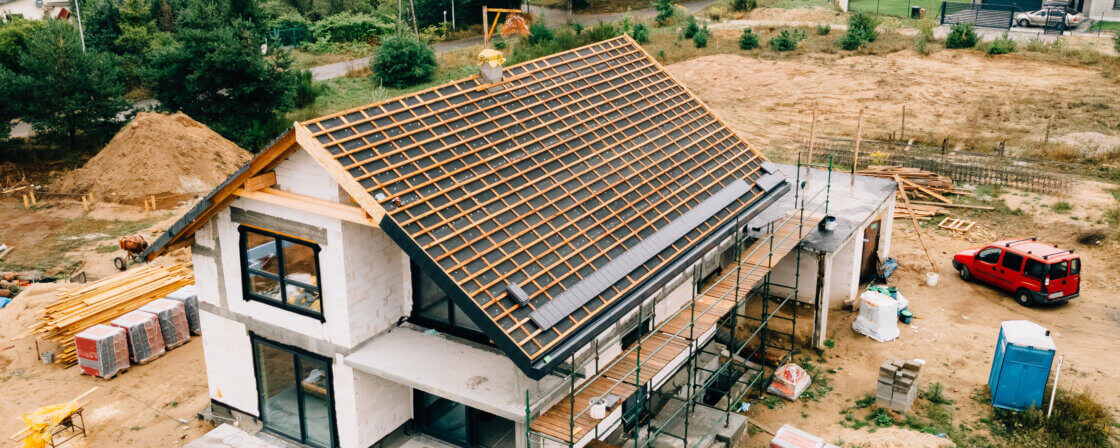Read also the second and third parts of this series.
In the second part, you will learn about non-bank mortgage options and why they are or are not worthwhile. You will also find a description of how a mortgage works for a foreclosed property you acquired at auction. You will also find out if it is possible to take out a mortgage on a commercial property, and what the possible alternatives are. Finally, you can then look at how early repayment of a mortgage works.
The third part looks at the possibility of buying a house on hire purchase without a mortgage. Next, you will learn what conditions you need to meet to get a mortgage on a property. We will also answer questions about the condominium mortgage and the possibility of a mortgage without a mortgage or with a mortgage on another property.
How to sell a property with a mortgage?
There are several situations when you need to sell a house or apartment with a mortgage. For example, you can’t keep up with the payments, you ‘re getting divorced and don’t want to continue making payments together, or you’ve found a new home and want to sell the old one. It is also often the case that people want to sell a flat with a mortgage and buy a house. So what is the procedure for selling a flat, house or land with a mortgage?
Are you solving a similar problem?
Are you planning to sell or buy a property?
If you’re buying or selling a property, it’s worth using an escrow service. You can be sure that your money is safe. If you want to set up an escrow or help with the process of buying or selling a property, contact our attorneys.
I want to help
- When you order, you know what you will get and how much it will cost.
- We handle everything online or in person at one of our 6 offices.
- We handle 8 out of 10 requests within 2 working days.
- We have specialists for every field of law.
Early repayment of the mortgage when selling the property
The first option to resolve this situation is to pay off the mortgage early. You can either do this from your own savings or take out a new loan to pay off the mortgage. This way you are then selling the property unencumbered by the mortgage. However, this method is not always available to everyone.
If you can’t manage to pay your mortgage, one option is to refinance. This can be applied for as soon as your fixation period ends. If refinancing would not result in lower payments and lower overall interest, you can try to transfer your mortgage to another bank where you can get better terms.
Sale of mortgaged property
Another option is to sell the property including the mortgage. However, the main obstacle to this is that you have to find a buyer who is willing to buy the property with the mortgage, and the bank you have the mortgage with must also approve it. Should the bank not approve the buyer, there is still the option of refinancing the mortgage and transferring it to another bank that will approve the buyer.
Another option is to find a buyer who has enough equity to buy the property and also pay off your mortgage. Alternatively, they can take out a mortgage to pay off your mortgage. However, this is where a problem can arise in the form of penalties for early repayment of the mortgage loan. However, it is only possible to get penalties if you have a fixation on your mortgage, not after it ends.
Transfer your mortgage to another property
Last but not least, there is also the option of transferring your mortgage to another property, but this is quite a difficult and lengthy process. In practice, it works by transferring the mortgage from your current property to a new property. You can then sell your current property without the mortgage being encumbered.
The main criterion when transferring the mortgage to a new property is that your new property (i.e. the property that the bank will now have mortgaged) must be of a high enough value. If it is not of sufficient value, you can guarantee another property (e.g. your parents’ flat).
If you decide to transfer your mortgage to another property, you will face the same processing as for your original property. You will need to get an appraisal of the value of your new property, apply for a mortgage to be registered at the Land Registry and insure the property. The bad news for you is that there is a charge for this, and you may not even be able to avoid the bank’s fees for transferring the mortgage. The whole process is also quite time consuming due to the involvement of the Land Registry.
Can I take out a mortgage to renovate my house?
Have you inherited an older house from your parents or does your current house or the house you are about to buy need major repairs but you don’t have the necessary savings for renovation? That’s okay, there is a home renovation mortgage.
A renovation mortgage is not much different from a conventional home mortgage. In the case of a renovation mortgage , you also guarantee the property – either the one you are going to renovate or another property (e.g. if the value of the renovated property is not sufficient). But what is different about a home renovation mortgage is the way it is taken out. Specifically, there are two ways:
- Drawing down the whole amount at once on the basis of an expert’s estimate – this often requires an itemised budget and a construction schedule.
- Drawing down the amount in instalments with invoices for the work done.
You will also be interested to know how budget increases and extensions work in the case of a renovation mortgage where the price is clearly stated. You don’t have to worry about getting into trouble. It is a normal thing to be reckoned with. You can draw a higher amount than the estimated amount and, equally usually, a lower amount if the renovation works out cheaper. In addition, there is usually a non-purpose part of a home renovation mortgage. You can use the money for anything (such as buying a pool, furniture or electronics).
Tip for article
If you’re looking to renovate your house, you shouldn’t miss out on the Fix Your Grandma’s House grant program. Thanks to this programme, you can get grants for insulation, photovoltaics, heat source replacement, water heating or a car charging point, up to 50% of eligible costs.
Do I have to have property insurance if I take out a mortgage?
Simply put, yes. Property insurance on a mortgage is part of the conditions of the mortgage. Property insurance covers damage to the building and structural components of the property (such as radiators or solar panels). The reason the bank requires property insurance on a mortgage is that it protects it from potential loss. This is because the bank has a mortgage on your house while the mortgage is being repaid, and if anything happens to it, it will lose some or all of the value of the mortgage. In the event of a loss, the insurance company will then pay the insurance premium to the bank and it will transfer it to you. You must then use it to repair the damage.
How to choose property insurance
Property insurance is most often determined by the bank itself, but if you’re arranging your own property insurance, these tips will come in handy:
- Make your needs clear: Determine the type and value of your property, identify potential risks and vulnerabilities specific to the location and type of your property (for example, if your house is in a flood zone, it’s worth insuring against this event).
- Do your research: do careful research into what the insurance market has to offer. The main factor determining the quality of insurance is the amount of the sum insured – that is, what the insurance company will pay you in the event of a loss. Also make sure that the insurance covers all claims that potentially affect you.
- Set a budget for your premiums: consider how much you can afford to invest in property insurance,
- Take advantage of discounts and packages: ask about discounts for combining multiple policies (e.g. car and home insurance).
- Ask for expert advice on insurance policies for multiple policies: Consider consulting with an insurance agent or broker to get personalized advice.
Tip for article
Do you need help with choosing insurance, financing a property or any other issue related to your finances? Then contact our partner Corona Lecta. They will discuss your financial, property and life goals with you and design a thoughtful strategic plan to achieve your goals.
When you are considering whether to take out a mortgage for a house or flat, remember that you need to inform yourself properly first. This is because careful planning, financial foresight and a thorough understanding of the options available will enable you to navigate the complex property landscape and secure the best possible deal.
Summary
Selling a property with a mortgage can be handled in several ways. You can pay it off early from savings or a new loan, sell the property with the mortgage with the bank’s approval, or transfer it to another property, which is administratively difficult. If you can’t manage the repayments, you can refinance at the end of the fixation or switch to another bank with more favourable terms.
The mortgage can also be used to renovate the house, whereby you guarantee either the renovated property or another property. The drawdown is done in one lump sum on the basis of an estimate or gradually with invoices. The budget can be adjusted and part of the loan can often be used for a non-purpose.
Property insurance is a condition of the mortgage and covers damage to the building. The choice of insurance should match the value and risks of the property, and it is worth comparing quotes and taking advantage of discounts.
Read also the second and third parts of this series.
In the second part, you will learn about non-bank mortgage options and why they are or are not worthwhile. You will also find a description of how a mortgage works for a foreclosed property you acquired at auction. You will also find out if it is possible to take out a mortgage on a commercial property, and what the possible alternatives are. Finally, you can then look at how early repayment of a mortgage works.
The third part looks at the possibility of buying a house on hire purchase without a mortgage. Next, you will learn what conditions you need to meet to get a mortgage on a property. We will also answer questions about the condominium mortgage and the possibility of a mortgage without a mortgage or with a mortgage on another property.




